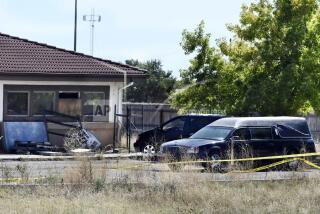Funeral Business Keeps Up With Times : Death: Chain ownership and bargain packages reshape what traditionally had been a family-operated industry.
- Share via
WEST HAVEN, Conn. — Death and taxes are certainties, but the funeral business is anything but a sure thing.
Once dominated by family-owned funeral homes using skills handed down for generations, the industry is being made over by chain-ownership. Funeral parlors are hiring college-trained non-relatives and offering low-cost, bargain packages.
“Consumers want more choices, and funeral directors have to offer more services,” said Sue Daniels, spokeswoman for the National Funeral Directors Assn.
“Ten to 15 years ago, everyone did the same thing. Viewing, service, burial.
“Now people have no visitation, or visitation without viewing, cremation with service or no service,” she said.
Celia Pinzi and her father, Nello, who run the West Haven Funeral Home, have learned to adapt to the industry’s changes.
They handle about 240 funerals a year, but to stay alive in the increasingly competitive business, they also offer no-frills cremation for $926.
“It’s a method we do in addition to our own services, and I definitely see a need for it,” Pinzi said.
Nationwide, 22,500 funeral homes handle 2.3 million deaths annually, with each funeral home conducting an average of 151 services per year. According to the National Funeral Directors Assn., the average funeral traditionally costs more than $4,000.
*
But more and more funeral homes are offering no-frills cremations for less than $1,000, with families choosing churches or homes for memorial services instead of a traditional wake.
According to the Cremation Assn. of North America, 19.11% of the people who died in the United States in 1992 were cremated. It is projected that by 2000, that figure will jump to 27%.
Richard Carmon and his brothers own five funeral homes in Connecticut. They have a full-time bereavement specialist who speaks to community groups, colleges, high school students, church groups and others about death and dying and makes personal family follow-up visits.
Carmon also sponsors a program for widows and widowers to talk out their grief.
Funeral homes also are facing mountains of paperwork to comply with increasing government regulation, and many are turning to computers.
Director’s Assistant, a software program made by Continental Computer Corp. in Jonesboro, Ark., offers a $1,995 basic package that includes government forms, sales contracts and an accounting program.
Businesses create their own databases of funeral details, from music to pallbearers.
A good many of the newest regulations come from the Occupational Safety and Health Administration, which is concerned with worker safety, such as exposure to chemicals and infectious disease. OSHA requires every funeral home employee, even part-time workers, to receive a day’s training every year.
James Burnside of Professional Compliance Inc. of Baltimore, makes his living bringing funeral homes into OSHA compliance, much of it record-keeping.
“Funeral directors are not good ‘paper’ people. They’re good ‘people’ people,” he said.
Just a few years ago, undertakers needed only two days of training. Today, 37 states require a minimum of a two-year program in funeral service.
Bernard Laskowski runs Connecticut’s only mortuary science program at Briarwood College in Southington.
This year the program graduated its first class.
“When I went to school, 90% or more of the students were coming from funeral service families. This first class, only two of the 22 were from family businesses,” he said.
Many family-owned funeral homes have been selling to companies such as Service Corp. International, the largest funeral-home chain in the world, with 856 homes.
More to Read
Inside the business of entertainment
The Wide Shot brings you news, analysis and insights on everything from streaming wars to production — and what it all means for the future.
You may occasionally receive promotional content from the Los Angeles Times.










